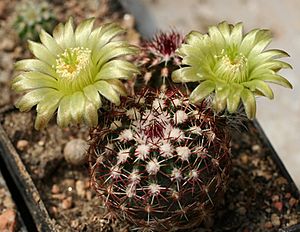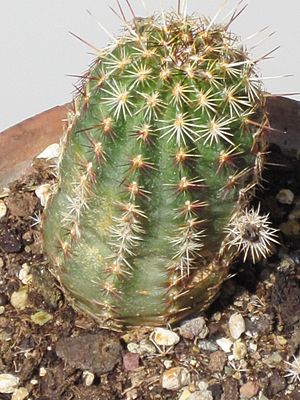Nylon hedgehog cactus facts for kids
The Nylon Hedgehog Cactus (Echinocereus viridiflorus) is a type of cactus. People also call it the green pitaya or small-flowered hedgehog cactus. This plant grows naturally in the central and southern United States. You can also find it in northern Mexico. It lives in many places like deserts, woodlands, and dry grasslands.
Quick facts for kids Nylon hedgehog cactus |
|
|---|---|
 |
|
| Conservation status | |
| Scientific classification |
|
| Kingdom: | Plantae |
| Clade: | Tracheophytes |
| Clade: | Angiosperms |
| Clade: | Eudicots |
| Order: | Caryophyllales |
| Family: | Cactaceae |
| Subfamily: | Cactoideae |
| Genus: | Echinocereus |
| Species: |
E. viridiflorus
|
| Binomial name | |
| Echinocereus viridiflorus Engelm.
|
|
| Script error: The function "autoWithCaption" does not exist. | |
Script error: No such module "Check for conflicting parameters".
Contents
What Does the Nylon Hedgehog Cactus Look Like?
This cactus has a stem that can be shaped like a ball or a cylinder. It grows from 3 centimeters (about 1 inch) to over 30 centimeters (about 1 foot) tall. The stem can be up to 9 centimeters (about 3.5 inches) wide.
Most of the time, this cactus grows as a single plant. But sometimes, you might see it in small groups with a few stems. The plant's body has ridges, and along these ridges are many areoles. These areoles are small bumps where the spines grow.
Spines and Flowers
The spines on the cactus can be many different colors. They might be red, yellow, white, or even purplish. Sometimes, they have two colors, with darker tips.
The flowers of the Nylon Hedgehog Cactus are small. They grow up to 3 centimeters (about 1 inch) long. The petals, called tepals, come in shades of yellowish, brownish, or greenish. Sometimes, they can even be red. They often have darker reddish stripes down the middle. The tips of these petals are quite thin.
Davis' Green Pitaya: A Special Cactus
There is a special type of this cactus called Davis' green pitaya. Its scientific name is Echinocereus viridiflorus var. davisii. Some experts even think it's a completely separate species called Echinocereus davisii.
Why Davis' Green Pitaya is Important
This special variety is very small. It grows no taller than 3 centimeters (about 1 inch). When there isn't much water, it can shrink even more. It might even pull itself under the ground, leaving only a few spines sticking out. Its flowers are a pretty yellow-green color.
Davis' green pitaya is very rare. It is listed as an endangered species by the government. This means it is in danger of disappearing forever. It only grows in one specific area: Brewster County, Texas. It likes to grow in rocky soil that comes from a special type of rock called novaculite. In 1984, only one group of these plants was known to exist. It is unlikely to spread to new areas because it needs this very specific type of soil to grow.
See also
 In Spanish: Echinocereus viridiflorus para niños
In Spanish: Echinocereus viridiflorus para niños
 | William L. Dawson |
 | W. E. B. Du Bois |
 | Harry Belafonte |



